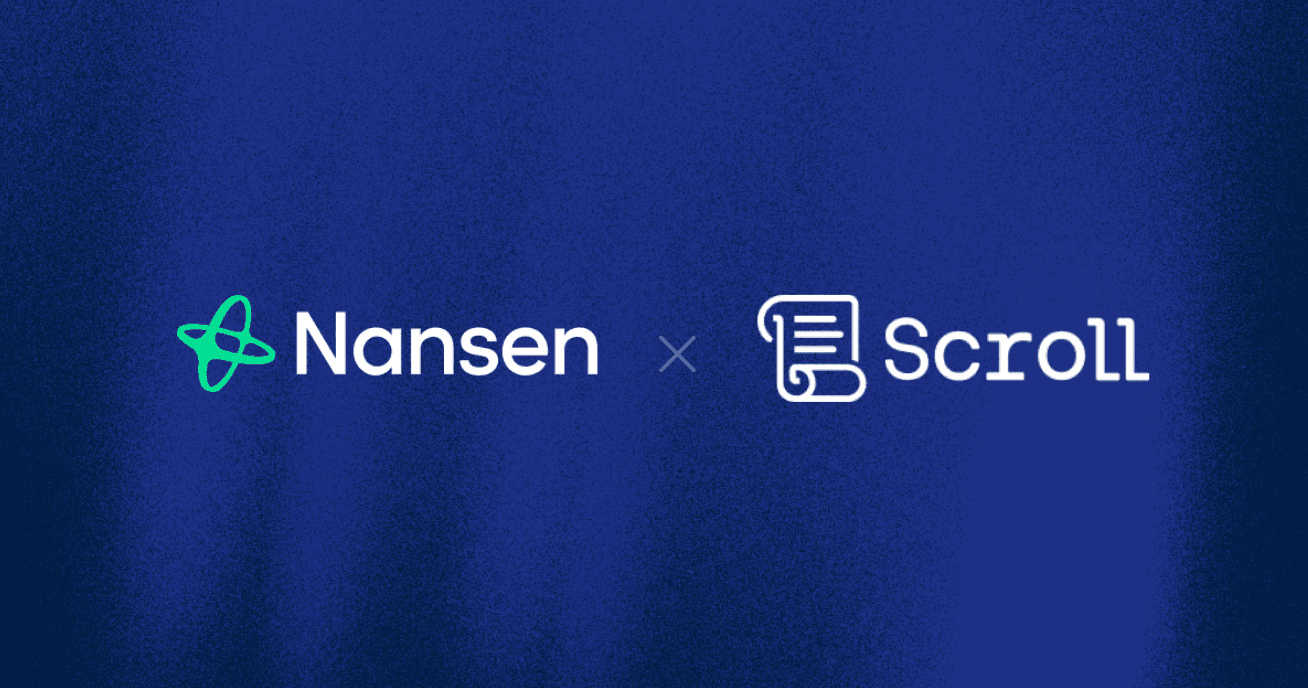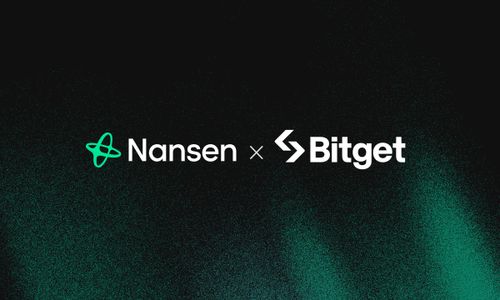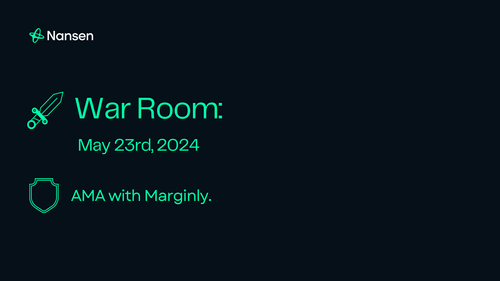Disclaimer: Nansen has produced the following report in collaboration with Slice Analytics as part of its existing contract for services provided to Scroll Foundation (the "Customer") at the time of publication. While Scroll Foundation has the right to review and provide feedback to Nansen, Nansen maintains full editorial control over the publication of this report. All views expressed are the independent opinions of Nansen's research analyst(s) who are the author(s) named in this report. This report is intended for informational purposes only and does not serve as investment, financial, professional, or other advice. For more information, please refer to the disclaimer at the end of this report, as well as our Terms of Service.
Overview
Scroll is a Layer-2 scaling solution for Ethereum built on a bytecode-equivalent zkEVM, enabling developers to deploy unmodified Ethereum smart contracts with lower costs and faster execution. As a zero-knowledge rollup, Scroll batches transactions off-chain and submits succinct cryptographic proofs to Ethereum, preserving decentralization and security while boosting scalability. With its open-source ethos and deep compatibility with existing Ethereum tooling including Solidity, Vyper, and Huff, Scroll is easy to onboard, allowing developers to scale without re-auditing or rewriting applications.
In Q1 2025, Scroll deepened its core infrastructure, decentralized governance, and developer experience. The network launched OpenVM, a modular zkVM framework built with Axiom to support custom opcodes, proof aggregation, and extensibility across zk circuit and ISA layers. Scroll also formalized decentralized governance through the launch of the Scroll Security Council and released the Tenderly integration, bringing enterprise-grade simulation and debugging tools to both Mainnet and Sepolia Testnet. Ecosystem incentives scaled through Scroll Sessions 2 and Scroll Open, which attracted over 750 builders across 80+ countries. These developments underscore Scroll’s commitment to scalability, modularity, and a developer-first Open Economy.
Key Developments: Q1 2025
- Scroll released OpenVM, a modular zkVM framework that introduces customizable architecture across the instruction set, zk circuits, and proof system. Developed in collaboration with Axiom, OpenVM enables efficient Rust-based proving, custom opcode integration, and native support for cryptographic primitives such as BN254/BLS12-381 pairings and Keccak/Poseidon2 hashing. The release includes proof aggregation, ECDSA verification, and compatibility with RISC-V (RV32IM), laying the foundation for future zk infrastructure upgrades and app-specific zkVM design.
- Scroll introduced the decentralized Security Council to manage protocol upgrades and emergency execution with enhanced decentralization guarantees. The Council operates a 9-of-12 multisig structure and comprises twelve highly vetted members from leading ecosystem organizations including OpenZeppelin, L2BEAT, Zellic, Secureum, and the Ethereum Foundation. In addition to protocol execution, the Council holds administrative control over Scroll’s governance contracts and will play a central role in enforcing censorship resistance and liveness guarantees required for Stage-1 rollup maturity.
- Scroll integrated Tenderly, giving developers access to a complete debugging and simulation toolkit across both Mainnet and Sepolia Testnet. The integration includes Tenderly’s high-throughput Node RPC, Virtual TestNets synchronized with live onchain state, advanced simulation tools, real-time alerts, and Web3 Actions. Developers can test smart contract behavior under real-world conditions, resimulate failed transactions, preview gas usage, and automate responses to onchain events, dramatically improving dApp development speed and production reliability.
- Scroll Open recognized eleven top-performing teams from a global pool of over 750 builders. The winning Scroll Open teams (as well as a few other participants) have been invited to join the Scroll team at Open Campus in the heart of Malaysia, Kuala Lumpur. Campus is a 8-week long initiative (with the first 4 weeks IRL), where builders received mentorship on how to become successful founders. In total, there were 10 teams from Argentina, Kenya, Canada, Malaysia, India and more, who took part in Campus.
- Scroll expanded its infrastructure integrations to enable broader composability and multichain functionality. Chainlink Data Streams brought low-latency oracle support for real-time DeFi pricing and execution. Everclear added a zkEVM-native clearing layer for efficient cross-chain settlement between solver networks. Push Chain introduced chain abstraction infrastructure to Scroll, allowing users to access apps across Solana, Aptos, and Bitcoin L2s with universal identity, fee abstraction, and support for stateless transactions, all without bridging or leaving the Scroll UX environment.
- Scroll unveiled an ambitious 2025 roadmap targeting Stage-1 zkRollup maturity by April and Stage-2 by year-end, with major advancements in security, scalability, and user experience. Key upgrades include the launch of a Security Council, real-time proving (<30s), support for 10,000 TPS with sub-cent fees, and account abstraction via EIP-7702 and RIP-7212. Scroll also plans to migrate its sequencer to Reth, deploy its modular zkVM Ceno, and expand global fiat on/off-ramps, all while maintaining Ethereum-level security to onboard the next wave of developers and users.
Ecosystem
DeFi
- Quill is Scroll’s native overcollateralized stablecoin protocol, adapted from Liquity V2 to power the $USDQ stablecoin within a low-cost, high-throughput environment. It supports ETH and liquid staking assets like stETH and eETH as collateral, allowing users to maintain yield exposure while accessing stablecoin liquidity. Borrowers can set interest rates within a flexible range, and an efficient liquidation mechanism ensures protocol stability during volatility. Fully transparent and non-custodial, Quill serves as a foundational component of Scroll’s DeFi ecosystem, enabling composable, capital-efficient strategies that align with the network’s vision for a decentralized, yield-bearing Open Economy.
- Chainlink deployed its low-latency market data standard on Scroll via Chainlink Data Streams. This infrastructure supports pull-based oracles delivering high-frequency pricing for DeFi apps. It enables execution speeds comparable to centralized exchanges while maintaining decentralized security guarantees.
- Scroll Open showcased emerging innovation across DeFi through its top three Grand Prize winners: Foresight, a decentralized prediction market with integrated lending; Polystream, a mobile-first AI-powered yield aggregator with fiat ramps and gasless UX; and synthOS, a platform that suggests personalized crypto yield plans based on users’ past onchain history.
- Everclear benefits from native Ethereum compatibility, high-throughput execution, and fast finality—critical for powering automated trade matching and order routing between DeFi applications across chains. Solver networks on Everclear gain access to shared liquidity, reduced friction for settlement execution, and seamless composability with Scroll-native assets. The collaboration positions Scroll as a foundational zk-based liquidity and settlement layer for cross-domain financial coordination.
- ViFii is a decentralized onchain peer-to-peer stablecoin market focused on emerging markets like Nigeria and Kenya, launching soon on Scroll. It enables users to mint synthetic USD-backed assets from regional currencies, supporting cross-border payments and local transfers. Built on Scroll, ViFi benefits from low fees and fast execution, making it ideal for remittances and everyday transactions. The project highlights Scroll’s growing role in powering real world financial tools in underserved markets.
NFTs & Gaming
- Beamit launched a decentralized 3D avatar generator on Scroll that converts PFP NFTs into metaverse-ready avatars. Users can mint avatars with proof of provenance and deploy them across OnCyber, Monaverse, and Dverso, extending NFT utility across immersive environments.
Enterprise & RWAs
- Scroll hosted the Africa Tour in March, including in-person summits in Lagos and Nairobi focused on real-world assets, stablecoins, and payment infrastructure. These events deepened developer engagement across African fintech hubs and highlighted local use cases for DeFi and tokenized assets.
- Scroll integrated with Push Chain, allowing users to access non-EVM apps and chains like Solana and Aptos without bridging or leaving the Scroll UX. Push ID enables universal identity and wallet abstraction, while the partnership unlocks cross-chain gaming, NFT, and AI agent applications built on shared settlement infrastructure.
- Paragon Open is an onchain launchpad and marketplace built on Scroll, focused on accelerating early-stage DeFi and DeSci projects. By leveraging Scroll’s low fees and zkEVM scalability, Paragon enables seamless token launches, fundraising, and investor onboarding for founders building scientific and financial applications. Designed to support real-world utility and transparent capital formation, it provides a compliant, high-throughput environment where teams can raise funds, distribute tokens, and deploy smart contracts without the limitations of traditional venture funding. As a native infrastructure layer within the Scroll ecosystem, Paragon strengthens the Open Economy by bridging DeFi innovation with decentralized science and real-world asset use cases.
Onchain Data
Daily Transactions
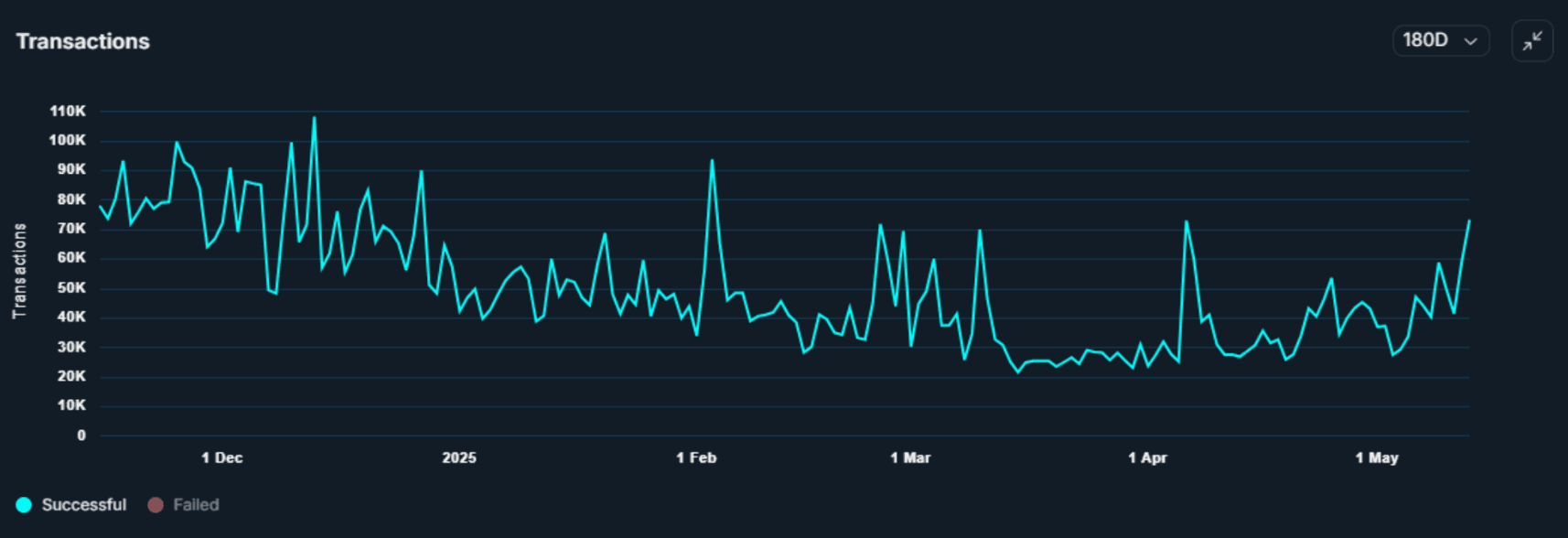
Scroll demonstrated steady transactional throughput across Q1 2025, with consistent activity reflecting broad protocol usage and ongoing dApp engagement. Transaction volumes showed resilience following the high-velocity period of late 2024 and remained strong across the quarter, with clear peaks in early February, mid-March. Recent growth in daily activity, especially into May, signals growing participation from users and developers. As more applications go live and infrastructure matures, Scroll continues to establish itself as a performant and dependable foundation for high-throughput, low-cost onchain experiences.
Daily Active Addresses

Scroll maintained a consistent base of active addresses throughout Q1 2025, with periodic spikes reflecting sustained engagement across ecosystem initiatives and protocol launches. Activity trends followed the momentum of late-2024 milestones, such as the launch of SCR, OpenVM, and Scroll Sessions—and remained strong through the first quarter, with noticeable upticks in late January, mid-March, and early May. These surges coincided with events like Scroll Open announcements and the deployment of flagship protocols including Quill Finance. As the network continues to expand with new native protocols, enhanced developer tooling, and multichain integrations. Scroll is laying the groundwork for long-term ecosystem resilience and a thriving onchain economy.
Top Entities by Users and Transactions
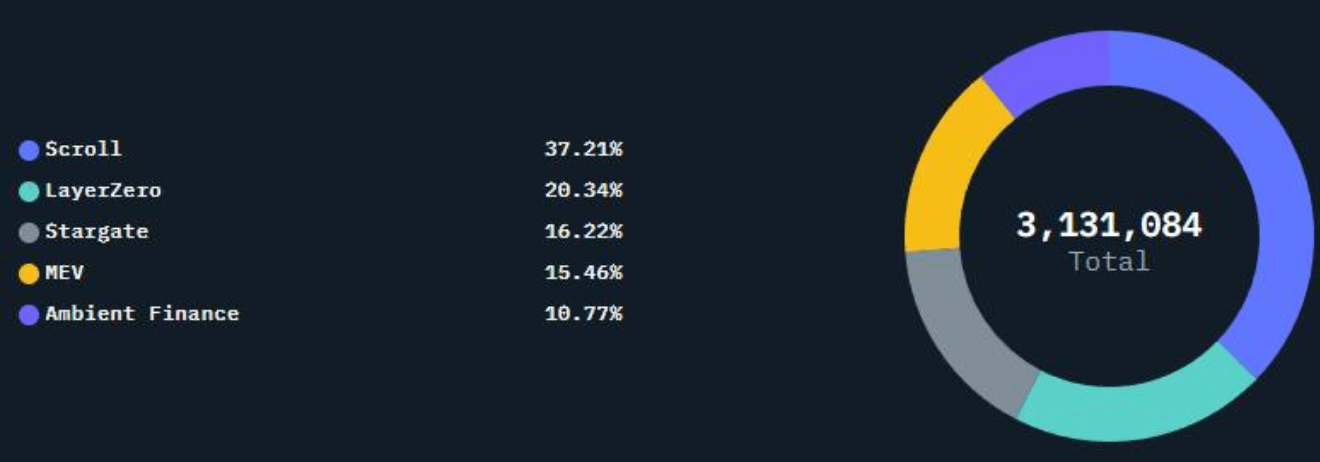
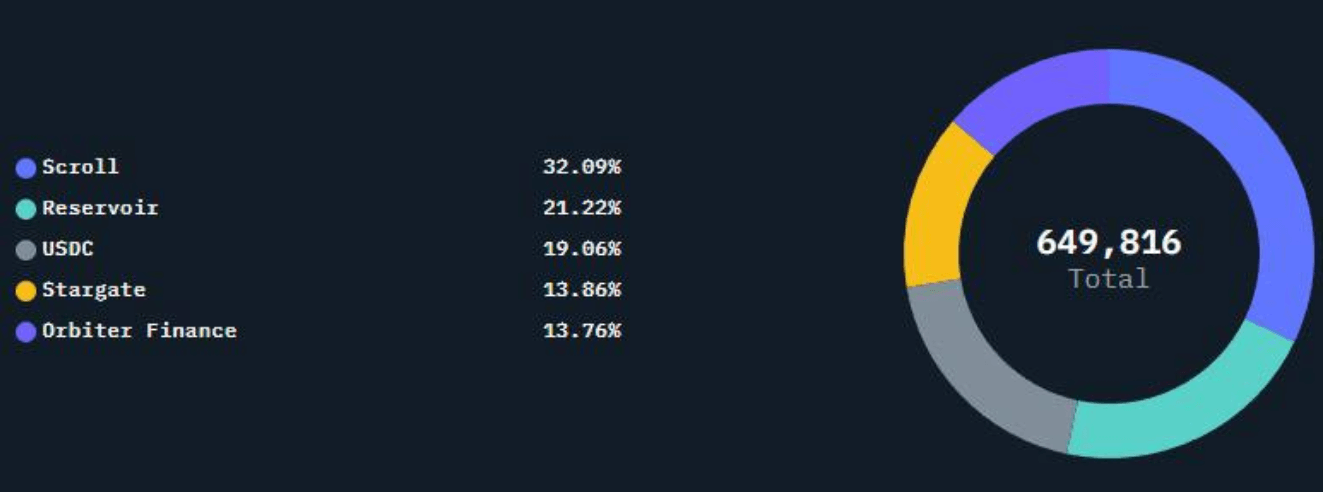
Scroll’s top entities by users and transactions highlight a well-rounded ecosystem anchored by core infrastructure, bridging protocols, and liquidity hubs. Native Scroll operations led across both dimensions, accounting for 37.21% of user activity and 32.09% of transactions, reflecting deep protocol engagement. Interoperability platforms like LayerZero and Stargate featured prominently, underscoring strong cross-chain demand, while MEV participation signaled Scroll’s appeal for latency-sensitive activity. On the transactional side, Reservoir drove over 21% of interactions, showcasing NFT-related liquidity flow, alongside significant stablecoin movement via USDC and rollup connectivity through Orbiter Finance. This distribution reinforces Scroll’s growing utility across DeFi, bridging, and multichain asset operations.
Closing Thoughts
Q1 2025 reinforced Scroll’s trajectory as a foundational pillar of Ethereum’s Layer 2 ecosystem, with steady progress across core infrastructure, decentralized governance, and protocol composability. The rollout of OpenVM marked a technical leap forward, enabling modular zkVM design and laying the groundwork for future application specific zk implementations. The launch of the Scroll Security Council formalized governance decentralization, aligning the network with Stage 1 maturity goals while advancing long term resilience.
DeFi continued to grow with the introduction of new use cases through Scroll Open, and the emergence of protocols like Rho Markets, Everclear, and Quill Finance. ViFi showed how Scroll’s low cost architecture can support financial access in emerging markets, while Paragon introduced a native launchpad model to accelerate early stage DeFi and DeSci projects. Scroll Open ( ttps://open.scroll.io) and [Scroll Sessions 2 drove global developer engagement, reinforcing the network’s position as a launchpad for both consumer and institutional use cases. Key integrations with Chainlink, Push Chain, and Tenderly improved developer tooling and enabled broader multichain functionality.
Onchain activity remained strong and diverse, supported by participation in stablecoin usage, NFT infrastructure, bridging, and MEV. As Scroll moves toward Stage 1 status and continues building its Open Economy vision, the momentum of Q1 2025 positions the network to scale sustainably and inclusively, strengthening its role as a high performance, developer first destination for Ethereum innovation.

